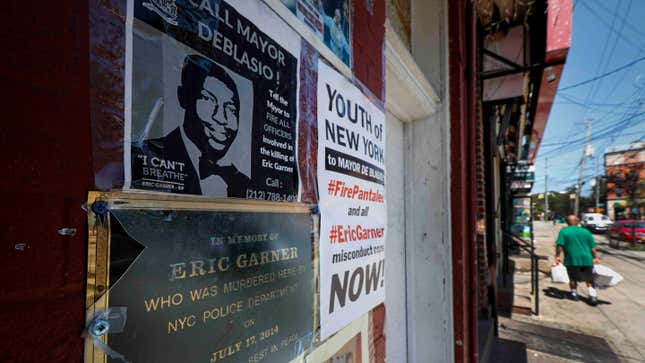
Eric Garner’s final words, “I can’t breathe,” still reverberate in the streets more than seven years after his death, driven by a movement fighting for justice and accountability for victims of police brutality. On Monday, a summary judicial inquiry was opened in the case. This is a rare judicial process that allows the public to lead an investigation into public officials.
New York Police Department officer Daniel Pantaleo, who held Garner in an unauthorized chokehold in July 2014, was fired for his involvement after a department disciplinary trial in August 2019. Garner’s mother and sister, Gwen Carr and Ellisha Flagg Garner, along with other petitioners accuse the NYPD of not properly investigating and disciplining all officers in Garner’s death.
CNN reports that the inquiry will focus on the actions of NYPD officers during and after the use of force in Garner’s arrest as well as any allegations surrounding the case. New York Supreme Court Judge Erika Edwards began the proceeding by saying that no one will be criminally charged at the end of the inquiry.
“This hearing will lead to further accountability for his death and advance the cause of racial justice in our criminal justice system, both in our city and across the nation,” said Garner family attorney Alvin Bragg.
The first witness called to testify was NYPD Lt. Christopher Bannon who was caught in a text message exchange with another officer saying that Garner’s death was ‘no big deal’ because the arrest was lawful.
“That was a real slap in the face. For you to say that there is not a big deal and my son laid dead on the ground,” Carr said at a news conference Monday, according to CNN. “There was no sympathy, no empathy; it was just business as usual. Eric’s life doesn’t mean anything to him. He was just another person that one of his officers had killed.”
Bannon testified that he was trying to put the officer’s mind at ease. “I’ve seen way too many people injure themselves, so this was more of a mindset to me, a common sense mindset to me, as far as trying to prevent them from going down that road and potentially injuring themselves,” he said.
The second witness to testify was Officer Justin D’Amico. CNN reports that it was his decision to arrest Garner. On the list of charges that D’Amico wrote, only hours after Garner’s death, was felony cigarette tax evasion. This crime was a part of several “quality of life” crimes that were the focus of a meeting with officials at NYPD headquarters four months prior to the fatal arrest, CNN notes.
Here’s what happened when D’Amico got on the stand, from CNN:
The state law D’Amico cited in his report would require someone to possess at least 10,000 cigarettes for the purpose of selling them. But, in his report, D’Amico wrote Garner had been in possession of “5 packs” of cigarettes.
“If you knew that this was incorrect and it was wrong then why did you continue to write down this charge on your paperwork as a felony?” Edwards, the judge, asked.
“That I wrote down. It could just be a mistake,” D’Amico said, adding later, “I never meant to misinform the reader by any means.”
D’Amico will continue to be questioned on Tuesday.
Some other allegations being investigated during the inquiry are a lack of adequate medical care for Garner on the scene and NYPD officers leaking both his arrest and medical history to the press.
ABC News reports that former officer Pantaleo, who was never indicted in Garner’s death, will not be a part of the inquiry because he was fired. The judge has also excused New York City Mayor Bill de Blasio and three police commissioners from testifying.
“The bigger question is why didn’t the mayor, in seven plus years, intervene at any point to say that, ‘you know what, it is unacceptable that there is so much misconduct surrounding this case of the killing of Eric Garner and I want every rock turned over, I want transparency on all of this and I want ever officer held accountable,’” Joo-Hyun Kang, who leads Communities United for Police Reform, said according to CNN.
In 2015, the city agreed to pay Garner’s family $5.9 million in a settlement. However, no amount of money can match the value in holding every officer accountable for failing Garner that day.

